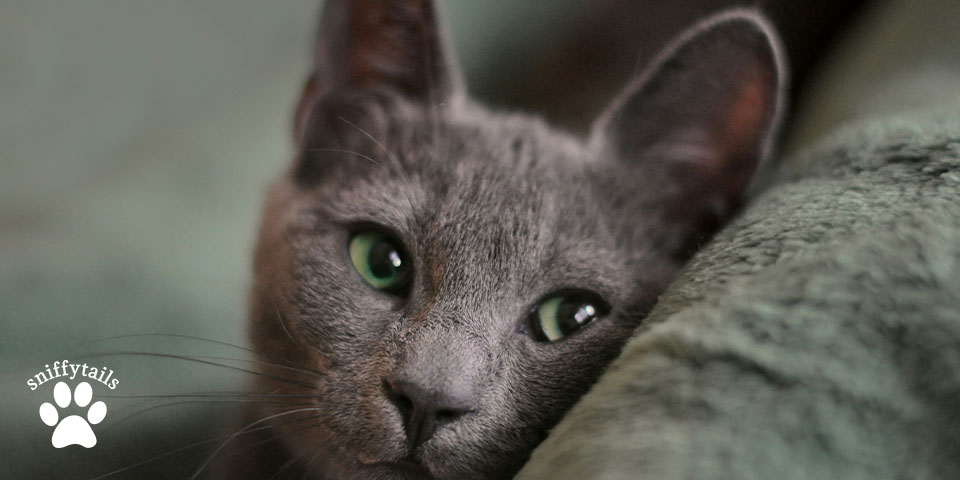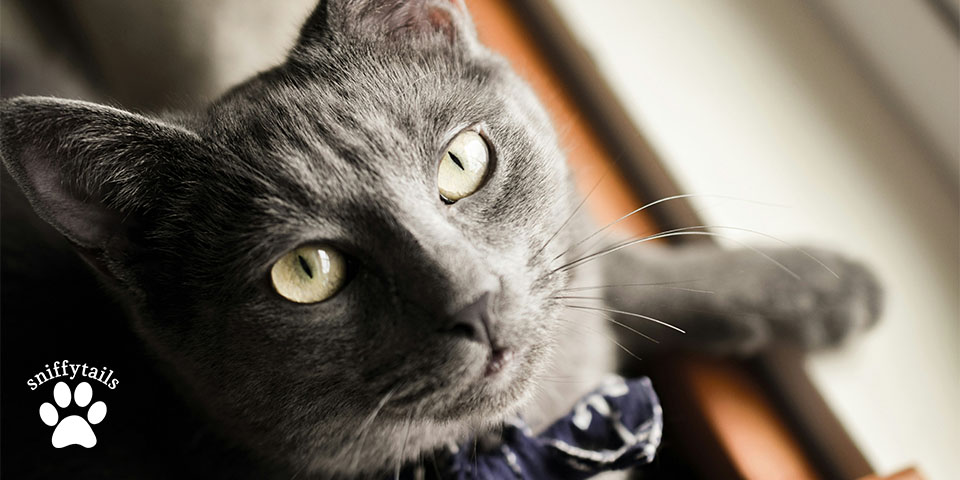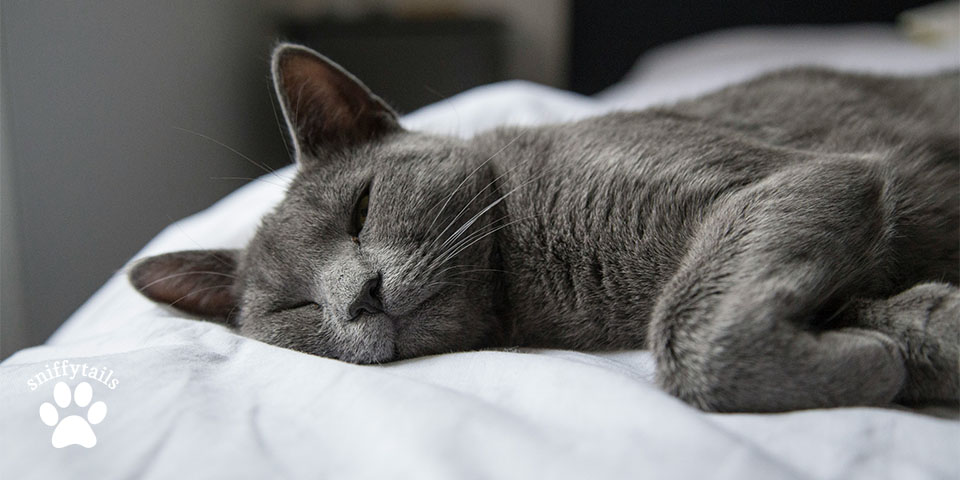How to Take Care for a Russian Blue
Topics of Our Article
ToggleRussian Blue Care focuses on meeting the needs of this intelligent and affectionate cat breed to ensure their well-being. These cats require a balanced diet rich in protein to support their sleek, muscular build and maintain a healthy weight. Regular veterinary check-ups and vaccinations are essential to prevent health issues such as dental disease and obesity. The Russian Blue’s dense double coat benefits from weekly brushing to reduce shedding and hairballs. Providing interactive toys and engaging activities is crucial for their mental stimulation, given their playful and curious nature. Creating a calm and stable environment helps them thrive, as Russian Blues can be sensitive to changes in their surroundings. Additionally, early socialization and positive reinforcement training are important for fostering good behavior and adaptability.
| Trait | Description |
|---|---|
| Origin | Russia |
| Size | Medium |
| Weight | 7-12 pounds (3-5.5 kg) |
| Height | 9-11 inches (23-28 cm) |
| Lifespan | 15-20 years |
| Coat | Short, dense, and plush |
| Color | Blue-gray with a silvery sheen |
| Temperament | Gentle, intelligent, playful |
| Exercise Needs | Moderate; enjoys interactive play |
| Grooming Needs | Low; weekly brushing |
| Common Health Issues | Generally healthy, watch for obesity |
| Training Needs | Moderate; responds well to positive reinforcement |
| Socialization | Enjoys company but can be shy with strangers |
| Good with Children | Yes |
| Good with Pets | Yes, especially if socialized early |

What is the Temperament of Russian Blues?
Russian Blues are renowned for their gentle, intelligent, and playful nature, making them delightful companions. These cats tend to be reserved with strangers but are deeply affectionate and loyal to their families. They thrive in environments that provide mental stimulation and interactive play. Their key traits include:
-
- Affectionate and loyal: Russian Blues form strong bonds with their owners, seeking out their company and affection.
-
- Intelligent and curious: They enjoy engaging in activities that challenge their minds, such as puzzle toys and interactive games.
-
- Quiet and well-mannered: These cats are usually calm and exhibit well-behaved manners, making them ideal for households that prefer a peaceful environment.
Incorporating these characteristics into your Russian Blue care routine will help ensure they lead a happy and fulfilling life. Their loving nature and curiosity make them not only wonderful pets but also fascinating companions who enrich the lives of their owners. By understanding and nurturing these traits, you can create a harmonious and joyful home for your Russian Blue.

How Should You Feed Your Russian Blue?
Proper nutrition is a cornerstone of Russian Blue care. A balanced diet ensures they remain healthy and energetic.
Ideal Diet and Nutrition Tips
Feeding your Russian Blue a diet rich in high-quality protein is essential for maintaining their muscle mass and overall health. Sources such as chicken, fish, and turkey are excellent choices. Including healthy fats like omega-3 and omega-6 fatty acids supports a shiny coat and healthy skin. Carbohydrates from whole grains, such as brown rice and oats, provide sustained energy. Additionally, vitamins and minerals from fruits and vegetables contribute to their overall well-being.
-
- High-quality protein: Chicken, fish, and turkey.
-
- Healthy fats: Omega-3 and omega-6 fatty acids.
-
- Carbohydrates: Whole grains like brown rice and oats.
-
- Vitamins and minerals: Fruits and vegetables.
Recommended Feeding Schedule
Establishing a consistent feeding schedule is important for your Russian Blue’s health. Kittens require more frequent meals to support their rapid growth, so feeding them 3-4 times per day is recommended. Adult Russian Blues thrive on 2 meals per day, which helps maintain their energy levels and prevents overeating. For senior cats, 2 smaller meals per day can aid digestion and prevent obesity.
-
- Kittens: 3-4 meals per day.
-
- Adults: 2 meals per day.
-
- Seniors: 2 smaller meals per day.
Incorporating these diet and nutrition tips into your Russian Blue care routine will help ensure they receive the necessary nutrients to stay healthy and active. By following a proper feeding schedule and providing a balanced diet, you can support your Russian Blue’s long-term health and happiness.
What Are the Exercise Needs of a Russian Blue?
Proper exercise is essential for maintaining the health and happiness of your Russian Blue. Ensuring they get adequate physical and mental stimulation is a key part of Russian Blue care.
Daily Exercise Requirements
Russian Blues need at least 30 minutes of play daily. Providing a variety of physical and mental activities helps keep them engaged and active.
-
- At least 30 minutes of play daily: Essential for physical health.
-
- Variety of physical and mental activities: Keeps them stimulated and happy.
Suggested Activities and Playtime Ideas
Incorporating diverse activities into their routine can make exercise enjoyable for your Russian Blue.
-
- Interactive toys: Laser pointers, feather wands.
-
- Climbing structures: Cat trees, shelves.
-
- Fetch and puzzle toys: Stimulate their intelligence.
Tips to Prevent Overexertion
While exercise is important, it’s equally crucial to ensure your Russian Blue doesn’t overexert themselves.
-
- Monitor activity intensity: Ensure they don’t overexert themselves.
-
- Provide rest breaks: Allow time for recovery.
-
- Adjust play based on age and health: Tailor activities to their specific needs.
By following these guidelines, you can ensure your Russian Blue stays fit and healthy, enjoying a balanced and active lifestyle. Incorporating these exercise needs into your Russian Blue care routine will contribute to their overall well-being and happiness.

How Do You Groom a Russian Blue?
Proper grooming is essential for keeping your Russian Blue healthy and well-groomed. Regular grooming helps maintain their coat, ears, nails, and teeth.
Recommended Brushing and Bathing Routines
Maintaining a grooming routine is key to your Russian Blue’s overall health. Brush their coat weekly using a soft-bristle brush to remove loose fur and reduce shedding. While Russian Blues typically do not require frequent baths, bathe them as needed using a hypoallergenic cat shampoo to keep their coat clean.
-
- Brush coat weekly: Use a soft-bristle brush to remove loose fur.
-
- Bathe as needed: Typically, Russian Blues do not require frequent baths.
Ear, Nail, and Dental Care
Regular ear, nail, and dental care are crucial for preventing infections and maintaining your Russian Blue’s health. Clean their ears weekly with a vet-approved cleaner to prevent buildup and infections. Trim their nails every 2-3 weeks using sturdy nail clippers to avoid overgrowth and discomfort. Brush their teeth at least three times a week with cat-specific toothpaste to promote good oral hygiene and prevent dental diseases.
-
- Clean ears weekly: Use a vet-approved cleaner.
-
- Trim nails every 2-3 weeks: Prevent overgrowth.
-
- Brush teeth regularly: At least three times a week with cat-specific toothpaste.
Products and Tools to Use
Using the right products and tools can make grooming your Russian Blue more effective and comfortable. A soft-bristle brush is ideal for their dense coat, while hypoallergenic cat shampoo is gentle on their skin. Sturdy nail clippers are essential for regular nail trimming, and a cat-specific toothbrush and toothpaste are important for maintaining dental health.
-
- Soft-bristle brush: Ideal for their dense coat.
-
- Hypoallergenic cat shampoo: Gentle on the skin.
-
- Sturdy nail clippers: Essential for regular nail trimming.
-
- Cat-specific toothbrush and toothpaste: Important for dental health.
Incorporating these grooming practices into your Russian Blue care routine ensures they stay healthy, comfortable, and well-groomed, contributing to their overall well-being and happiness.
What Health Issues are Common in Russian Blues ?
Understanding the common health issues that Russian Blues may face is essential for providing proper care. Regular veterinary visits and preventative measures play a significant role in maintaining their health.
Regular Vet Visits and Checkups
Regular vet visits are crucial to monitor your Russian Blue’s health. Annual checkups and vaccinations are essential for overall health, while routine blood tests help detect potential health issues early.
-
- Annual checkups and vaccinations: Essential for overall health.
-
- Routine blood tests: Detect potential health issues early.
Common Health Problems to Watch For
Russian Blues can be prone to certain health conditions. Being aware of these can help in early detection and treatment:
-
- Obesity: Can be managed with a proper diet and regular exercise.
-
- Bladder stones: Monitoring urinary health is crucial to prevent this issue.
-
- Heart disease: Regular vet checkups can catch early signs and help manage the condition.
Preventative Care Measures
Preventative care is key to minimizing the risk of health issues in Russian Blues. Ensuring they have a healthy diet and regular exercise can help maintain an ideal weight. Joint supplements can support joint health, and regular dental care can prevent dental diseases.
-
- Healthy diet and regular exercise: Maintain an ideal weight.
-
- Joint supplements: Support joint health.
-
- Regular dental care: Prevent dental diseases.
Incorporating these preventative care measures into your Russian Blue care routine will help ensure your cat remains healthy and happy. Regular vet visits, a balanced diet, and proper exercise are essential components of their overall well-being.

How Should You Train and Socialize a Russian Blue?
Proper training and socialization are essential for a well-behaved and happy Russian Blue. Employing effective techniques and early socialization can significantly enhance their behavior and adaptability.
Effective Training Techniques
Using effective training techniques is crucial for Russian Blue care. Positive reinforcement, such as treats and praise, encourages good behavior. Consistency with commands ensures your cat understands and follows them, while short, frequent training sessions help maintain their interest and focus.
-
- Positive reinforcement: Use treats and praise to reward good behavior.
-
- Consistency with commands: Ensure commands are clear and used consistently.
-
- Short, frequent training sessions: Maintain their interest and focus.
Importance of Early Socialization
Early socialization is vital for a well-adjusted Russian Blue. Exposing them to different environments and experiences helps them adapt to various situations. Kitten socialization classes facilitate interaction with other cats and people, while controlled interactions ensure positive experiences.
-
- Exposure to different environments and experiences: Helps them adapt to various situations.
-
- Kitten socialization classes: Facilitates interaction with other cats and people.
-
- Controlled interactions: Ensures positive experiences.
Addressing Common Behavioral Issues
Addressing behavioral issues early on is essential for maintaining a well-behaved Russian Blue. Teaching the “quiet” command can help manage excessive vocalization. Providing chew toys prevents destructive chewing behavior. If aggression issues arise, seeking professional help is recommended to ensure safe and effective behavior management.
-
- Teach “quiet” command for meowing: Helps manage excessive vocalization.
-
- Provide chew toys: Prevents destructive chewing.
-
- Seek professional help for aggression: Ensures safe and effective behavior management.
Proper Russian Blue care through effective training and socialization helps ensure your cat is well-behaved and comfortable in various situations, leading to a happier and healthier life. This approach is crucial for integrating your Russian Blue into your home and making them a delightful member of your family. By considering these aspects, you ensure your Russian Blue thrives and enjoys their environment, contributing positively to their overall well-being.
When it comes to cat breeds, Russian Blues are known for their intelligence and gentle nature, making them an excellent choice for families seeking a loving and interactive pet.
Conclusion
Caring for a Russian Blue involves several key aspects to ensure their health and happiness. This includes providing proper nutrition with a balanced diet, ensuring regular exercise to meet their energy needs, maintaining consistent grooming routines, and implementing effective training and socialization. By following these guidelines, you can ensure your Russian Blue remains healthy, happy, and well-behaved. Regular attention to these areas will contribute to a fulfilling and joyful life for your beloved cat, making them a delightful companion in your home.